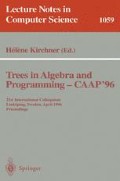Abstract
A maximal reduction strategy in untyped λ-calculus computes for a term a longest (finite or infinite) reduction path. Some types of reduction strategies in untyped λ-calculus have been studied, but maximal strategies have received less attention. We give a systematic study of maximal strategies, recasting the few known results in our framework and giving a number of new results, the most important of which is an effective maximal strategy in λΒη. We also present a number of applications illustrating the relevance and usefulness of maximal strategies.
Preview
Unable to display preview. Download preview PDF.
References
H.P. Barendregt. The Lambda Calculus: Its Syntax and Semantics. N.-H., 1984.
H.P. Barendregt, J. Bergstra, J.W. Klop, and H. Volken. Degrees, reductions and representability in the lambda calculus. TR Preprint 22, University of Utrecht, Department of Mathematics, 1976.
J.A. Bergstra and J.W. Klop. Church-Rosser strategies in the lambda calculus. Th. Comp. Sci., 9:27–38, 1979.
J.A. Bergstra and J.W. Klop. Strong normalization and perpetual reductions in the lambda calculus. J. of Information Processing and Cybernetics, 18:403–417, 1982.
M. Bezem and J.F. Groote, editors. Typed Lambda Calculi and Applications, volume 664 of LNCS. S.-V., 1993.
A. Church and J.B. Rosser. Some properties of conversion. Transactions of the American Mathematical Society, 39:11–21, 1936.
H.B. Curry and R. Feys. Combinatory Logic. North-Holland, Amsterdam, 1958.
R.C. de Vrijer. A direct proof of the finite developments theorem. J. of Symbolic Logic, 50:339–343, 1985.
R.C. de Vrijer. Surjective Pairing and Strong Normalization: Two Themes in Lambda Calculus. PhD thesis, University of Amsterdam, 1987.
R.O. Gandy. Proofs of strong normalization. In Seldin and Hindley [20], pp. 457–477.
J. Hudelmaier. Bounds for cut elimmination in intuitionistic propositional logic. Archive for Mathematical Logic, 31:331–353, 1992.
B. Jacobs. Semantics of lambda-I and of other substructure calculi. In Bezem and Groote [5], pp. 195–208.
Z. Khasidashvili. The longest perpetual reductions in orthogonal expression reduction systems. In A. Nerode and Yu. V. Matiyasevich, editors, Logical Foundations of Computer Science, volume 813 of LNCS, pp. 191–203. S.-V., 1994.
Z. Khasidashvili. Perpetuality and strong normalization in orthogonal term rewriting systems. In P. Enjalbert, et al., editors, 11th Annual Symposium on Theoretical Aspects of Computer Science, volume 775 of LNCS, pp. 163–174. S.-V., 1994.
J.W. Klop. Combinatory Reduction Systems. PhD thesis, Utrecht University, 1980. CWI Tract, Amsterdam.
J.-J. Lévy. Optimal reductions in the lambda-calculus. In Seldin and Hindley [20], pp. 159–191.
L. Regnier. Une équivalence sur le lambda-termes. Th. Comp. Sci., 126:281–292, 1994.
H. Rogers. Theory of Recursive Functions and Effective Computability. McGraw Hill, New York, 1967.
H. Schwichtenberg. An upper bound for reduction sequences in the typed lambda-calculus. Archive for Mathematical Logic, 30:405–408, 1991.
J.P. Seldin and J.R. Hindley, editors. To H.B. Curry: Essays on Combinatory Logic, Lambda Calculus and Formalism. Academic Press Limited, 1980.
M.H. SØrensen. Properties of infinite reduction paths in untyped λ-calculus. In Proc. of the Tbilisi Symp. on Logic, Language, and Computation, 1995. To appear.
J. Springintveld. Lower and upper bounds for reductions of types in 301-01 and λP. In Bezem and Groote [5], pp. 391–405.
F. van Raamsdonk and P. Severi. On normalisation. TR CS-R9545, CWI, 1995.
Author information
Authors and Affiliations
Corresponding author
Editor information
Rights and permissions
Copyright information
© 1996 Springer-Verlag Berlin Heidelberg
About this paper
Cite this paper
SØrensen, M.H. (1996). Effective longest and infinite reduction paths in untyped λ-calculi. In: Kirchner, H. (eds) Trees in Algebra and Programming — CAAP '96. CAAP 1996. Lecture Notes in Computer Science, vol 1059. Springer, Berlin, Heidelberg. https://doi.org/10.1007/3-540-61064-2_44
Download citation
DOI: https://doi.org/10.1007/3-540-61064-2_44
Published:
Publisher Name: Springer, Berlin, Heidelberg
Print ISBN: 978-3-540-61064-9
Online ISBN: 978-3-540-49944-2
eBook Packages: Springer Book Archive

